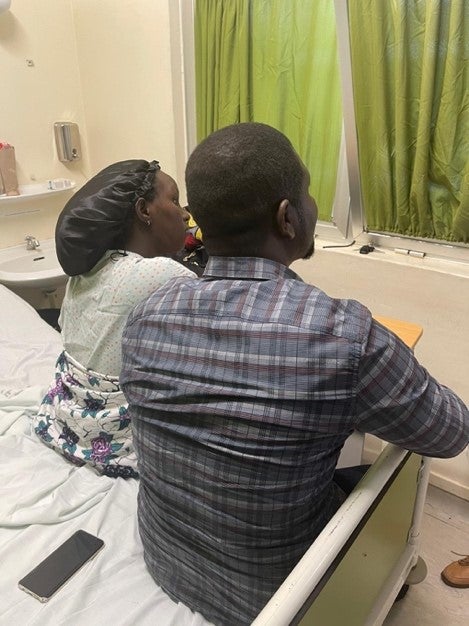Father’s Support During Labor
Week 2

Celeste Jimenez, MS Student
This week I spent my clinical experience in a labor and delivery unit at a local hospital. They say the processes of birth are the same in any country you’re in, which may be the case, but I noticed some small differences when meeting and talking with the patients and their support systems. What stood out was how supportive the husbands were in this particular hospital.
When meeting patients on the unit, we asked several questions related to their pregnancy, such as how many prenatal visits, how many weeks they were pregnant, and the sex of the baby. There was a little bit of a language barrier for one of the patients. However, her spouse sitting next to her with a better understanding of English, was able to help with translation. At first, the spouse translated our questions and his wife’s responses, but later, he could answer our questions himself as he had attended all the prenatal visits and knew the answers.
The previous week’s clinical experience was on the antenatal unit, so I experienced firsthand how common it was for husbands to attend prenatal visits with their wives. I learned this phenomenon was common in this hospital, but this was not typical of other health facilities in Rwanda. In my experience, it is not so common in the US either, where husbands usually only attend the prenatal visit around 20 weeks’ gestation when they can see the baby via ultrasound.
On the labor and delivery unit in Rwanda, the spouses I observed would walk with their wives around the unit holding hands as an intervention to progress the labor. I thought this was very sweet. I also observed how one of the husbands helped his wife to the bathroom holding her gown closed as she ambulated. One of the other couples who were having their second baby described how during the first labor experience at another hospital, the husband snuck into the birth as he was not allowed to be there. However, the couple both wanted the father to be present. The wife explained that her husband played more of an observational role then, but this time they wanted him to cut the cord and take a more hands-on approach. Here is the couple who were willing to have their photo taken, though we did not include their faces to maintain confidentiality.
I enjoyed observing the couple’s experiences. I recall my observations that fathers in the US try to be supportive and usually present during the birth, though they are not necessarily knowledgeable about pregnancy details or the birthing process. They help when they can but aren’t as hands-on as I experienced here in Kigali though this is likely not true for all US fathers. The World Health Organization recommends a companion of choice for all women throughout labour and childbirth.
Celeste Jimenez is in the graduate-entry nursing program at UIC and will be earning her Masters degree in December 2022. She is a first-generation college student and holds a bachelor’s degree in Biology from Oberlin College. She plans to earn her doctorate and become either a family nurse practitioner or midwife. She is Puerto Rican, born and raised in Chicago.